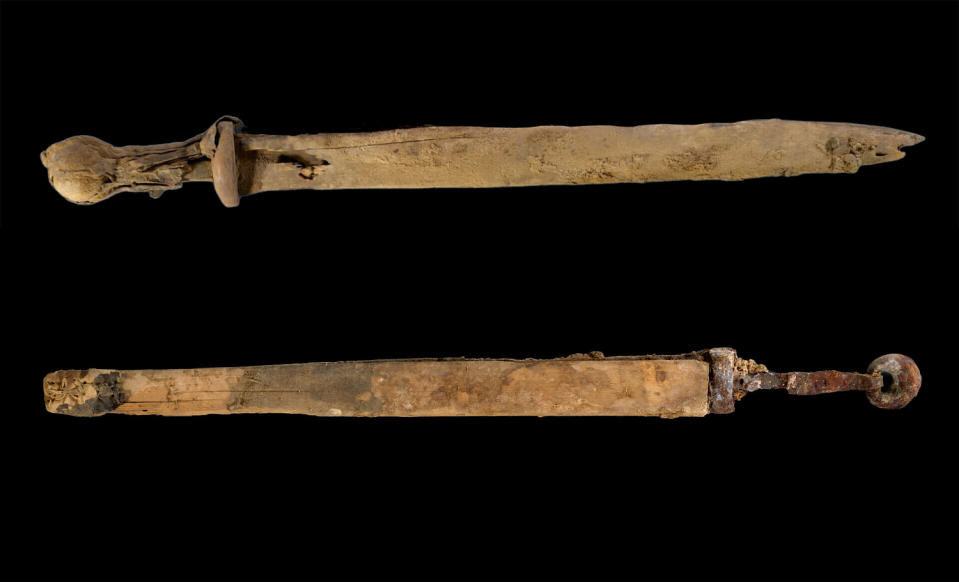Roman swords discovered in Dead Sea cave 1,900 years after Jewish rebellion
Israeli archaeologists announced Wednesday the discovery of four extremely rare and well-preserved Roman swords in a small hidden cave in an area of isolated cliffs overlooking the Dead Sea.
Experts from the Israel Antiquity Authority were amazed by the nearly 2,000-year-old weapons found, which they said could have been stolen from Roman soldiers by Jewish rebels and then hidden.
Jewish fighters staged a series of revolts against the Roman Empire around this time — further work is ongoing to establish whether the swords can be linked to the Bar Kokhba Revolt in 132-135 A.D. A coin from the time of the revolt was found near the cave entrance, in En Gedi Nature Reserve, about an hour outside Jerusalem.
The team that found the treasure trove had originally gone into the caves to inspect a stalactite with an ancient fragmentary ink inscription in Hebrew from time of the First Temple, also known as Solomon's Temple, which is dated to 990-931 B.C.
A team of three experts recently visited the cave to take multispectral images of the inscription in the hope of revealing additional writing not visible to the naked eye.

One of them, archaeologist Asaf Gayer of Ariel University, noticed a well-preserved pilum, a long-shafted Roman weapon that was typically more than 6 feet long. Nearby were pieces of worked wood that turned out to be the swords' scabbards.
"The hiding of the swords and the pilum in deep cracks in the isolated cave north of ‘En Gedi hints that the weapons were taken as booty from Roman soldiers or from the battlefield, and purposely hidden by the Judean rebels for reuse," Eitan Klein, one of the directors of the Judean Desert Survey Project, said in a statement.
"Obviously, the rebels did not want to be caught by the Roman authorities carrying these weapons."
Three of the "exceptionally well-preserved" swords — identified as the Roman spatha variety, used in both war and in gladiator battles — were still in their scabbards and measured 23 to 25 inches in length.
The fourth sword, with a ring at its end or pommel, was shorter and measured just under 18 inches in length. All four were confirmed to be of the type commonly used by Roman soldiers in the period.
Judea, now part of modern-day Israel, had been a Roman ally and then a province from 6 to 132 A.D., when Jerusalem was destroyed after the third Jewish-Roman War.

Further excavation of the same cave found artifacts dating as far back as the Chalcolithic period, about 6,000 years ago.
The unique dryness of the desert provides perfect conditions for the survival of ancient artifacts. Last year, experts announced the discovery of silver coins dating back 2,200 years, to the time of the Maccabean Revolt.
"Not all are aware that the dry climatic conditions pertaining in the Judean Desert enable the preservation of artifacts that do not survive in other parts of the country," said Eli Escusido, director of the Israel Antiquities Authority.
"This is a unique time capsule, whereby fragments of scrolls, coins from the Jewish Revolt, leather sandals, and now even swords in their scabbards, sharp as if they had only just been hidden away today."
The Israel Antiquities Authority is carrying out an extensive survey in the caves around the Judean Desert in an attempt to prevent looting. So far, hundreds of caves have been searched and 24 excavations carried out over six years.

"In the course of the project, we unfortunately encountered tens of caves that have been plundered since 1947," said Amir Ganor, director of the Antiquities Looting Prevention Unit at the Israel Antiquities Authority and one of the directors of the survey project.
"I shudder to think how much historical knowledge would have been lost had the looters reached the amazing artifacts in this cave before the archaeologists," he added.
This article was originally published on NBCNews.com

